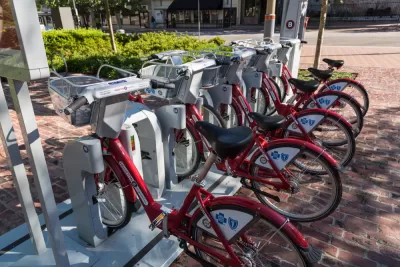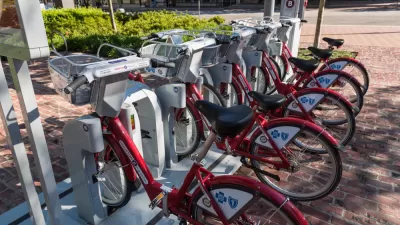Metro plans to invest half a million dollars in the city’s bike share system to improve connectivity to buses and trains.

According to the Houston Chronicle’s Dug Begley, the region’s Metropolitan Transit Authority could take over Houston’s bike share system. The change could boost efforts to better integrate bike share into the city’s public transit system and provide efficient options for multimodal transportation in more neighborhoods. “The proposal would give the nonprofit and Metro six to nine months to work together on the system and then have Metro officials develop a plan for continuing the bike sharing initiative.”
The system was launched in 2012 and has grown to almost 1,000 bikes and e-bikes and 153 stations. More recently, its future has been under question, with half of stations closed in November to cut costs during the winter. “The hope, At-large Houston City Councilmember Sallie Alcorn said, is that Metro adds to and does not subtract from what already is available and popular with users.” Meanwhile, the agency plans to examine how it can more equitably distribute bikes and stations to neighborhoods that have been overlooked. Sprawling, auto-oriented Houston is building out its bike infrastructure, making an ambitious pledge to add thousands of miles of bike lanes and trails.
FULL STORY: Metro could take over Houston's BCycle, spending $500K to help people get to bus and train stops

Maui's Vacation Rental Debate Turns Ugly
Verbal attacks, misinformation campaigns and fistfights plague a high-stakes debate to convert thousands of vacation rentals into long-term housing.

Planetizen Federal Action Tracker
A weekly monitor of how Trump’s orders and actions are impacting planners and planning in America.

In Urban Planning, AI Prompting Could be the New Design Thinking
Creativity has long been key to great urban design. What if we see AI as our new creative partner?

King County Supportive Housing Program Offers Hope for Unhoused Residents
The county is taking a ‘Housing First’ approach that prioritizes getting people into housing, then offering wraparound supportive services.

Researchers Use AI to Get Clearer Picture of US Housing
Analysts are using artificial intelligence to supercharge their research by allowing them to comb through data faster. Though these AI tools can be error prone, they save time and housing researchers are optimistic about the future.

Making Shared Micromobility More Inclusive
Cities and shared mobility system operators can do more to include people with disabilities in planning and operations, per a new report.
Urban Design for Planners 1: Software Tools
This six-course series explores essential urban design concepts using open source software and equips planners with the tools they need to participate fully in the urban design process.
Planning for Universal Design
Learn the tools for implementing Universal Design in planning regulations.
planning NEXT
Appalachian Highlands Housing Partners
Mpact (founded as Rail~Volution)
City of Camden Redevelopment Agency
City of Astoria
City of Portland
City of Laramie





























